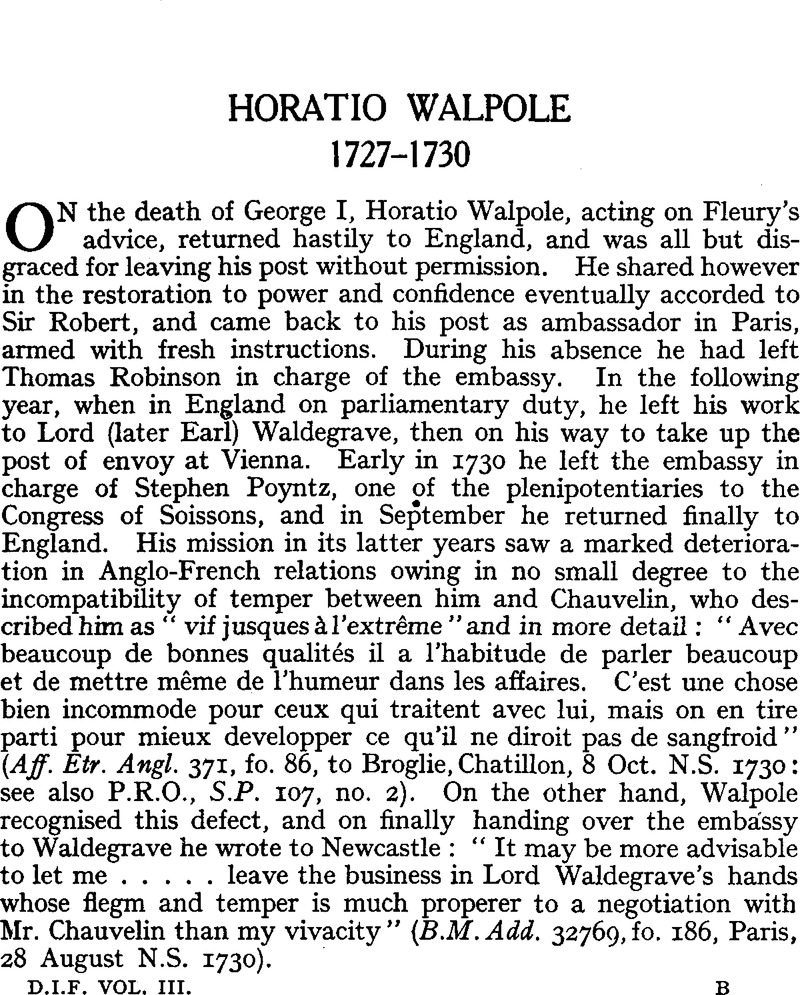No CrossRef data available.
Published online by Cambridge University Press: 24 December 2009

page 2 note 1 In P.R.O., S.P. 78, No. 187, there is on fo. an earlier draft of these instructions. The first clause has some interesting variations in that it has a preamble (“Whereas We being satisfied with the services which you have rendered to Our late Royal Father as his minister and afterwards in the quality of his Ambassador extraordinary and plenipotentiary to Our good brother the Most Christian King, have thought fit to send you back to him with the same caracter, when you have received these Our instructions,” etc.), and in this preamble the words “Royal Father ” have been substituted for “most dear Father of blessed memory.”
The fourth clause was drafted originally on the model of Stair's instructions but its final form is as follows :—“You shall take care that all the stipulations in the treaty between Our late Royal Father, His Most Christian Majesty and the States General signed at The Hague the 4th day of January 1717 and in all other treaties now in force between Us and the Most Christian King be complied with on his part as We on Ours shall always perform Our engagements to him by the said treatys.”
The clauses to be found in Stair's instructions concerning Jacobites, Dunkirk, the Pretender, Sweden and Muscovy (5, 6, 7, 8, 13, 14, 15) are omitted from Walpole's.
page 4 note 1 In point of fact, the Duke possessed a copy which he later surrendered.
page 6 note 1 The Pensionary and the Greffier (Slingelandt and Fagel).
page 7 note 1 Viz. that he was returning to Spain on mutually bad terms with Fleury (Walpole to Newcastle, Paris, 19 August 1727, N.S. very private, B.M. Add. 32751, fo. 243).
page 9 note 1 At the Congress.
page 10 note 1 Viz. That he will be a nuisance.
page 10 note 2 The treaty was signed on 25 November 1727, at Westminster (see Rousset, Recueil, Vol. IV, pp. 254–60 for the text).
page 13 note 1 Rottembourg's letter to the Marquis de la Paz will be found in Rousset, Recueil historique, Vol. IV, p. 34Google Scholar. See also Baudrillart, , Philippe V et la Cour de France, Vol. III, p. 379.Google Scholar
page 16 note 1 For a notice of this nobleman see below, p. 83. At this time he was acting as chargé d'affaires in H. Walpole's absence on parliamentary duty, awaiting an opportunity to proceed to Vienna as plenipotentiary.
page 16 note 2 See Chance, J. F., Diplomatic Instructions, Sweden, I, pp. xxix–xxxviiiGoogle Scholar, and The Alliance of Hanover, index, s.vv. Holstein and Schleswig.
page 23 note 1 Cf. Coxe, , Sir Robert Walpole, ed. 1798, Vol. II, p. 623Google Scholar, Newcastle to William Stanhope of the same date.
page 24 note 1 For the question of Emden and East Friesland see Rousset, Recueil, Vol. IV, pp. 281–509 ; Chance, Diplomatic Instructions, Denmark, pp. 73, 74, and Alliance of Hanover, pp. 481–2 ; Droysen, , Geschichte der Prenssischen Politik, Vol. IV, ii., p. 328.Google Scholar
page 25 note 1-1 Added in m. in George II's hand.
page 25 note 2-2 Cypher.
page 25 note 3 Cypher.
page 25 note 4 Amended by George II from ‘ feels.